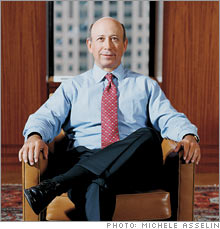
This week's favorite game was attacking Goldman Sachs for its outrageous compensation system, including expectations that the total bonus package for its employees might reach $ 22 billion. There is no doubt that, by any standards, such an amount is a record number per employee with $750,000 tying some of Goldman's highest payout years in recent memory. What this really does is create the real situation where never in history has the distance between Wall Street and Main Street been wider, and more shocking.
Demonizing Goldman Sachs, is made further easy by their weak attempt to calm down public anger with the creation of their $ 500 million small business fund. This attempt backfired immediately as everyone saw this as just "pocket money" (by Goldman standard) that does not come from a reduction in compensation and is a mere fraction of the bonus pool.
Goldman Sachs is giving the highest pay to its employees in the world. Does it not recognize that it owes its Wall Street leadership position and its very survival to the U.S. government? It is not because of the economic recovery that Wall Street is making money; it is because Wall Street is heavily subsidized by the Federal Reserve and the U.S. Treasury.
Yet, before we attack Goldman any further, let's take a step back and look at the scenario that set up this situation. Goldman is definitely making a lot of money, but this money includes a combination of public "rescues" that they were not initially entitled to: the $ 10 billion loan from the Treasury, the access to the "window" of the Federal Reserve as a new bank holding company, the rescue of AIG as well as market conditions where bank borrowings from the Treasury are close to zero. It paid interest for the money lent by the Treasury, around $ 425 million, a mere 4.25 %.
In today's Financial Times, Martin Wolf's op-ed entited Tax the Windfall Banking Bounuses suggest that "it is not unreasonable to recoup not only the direct fiscal costs of bail-outs but even some of the wider fiscal costs of the crisis."
Actually, if you talk to other banking executives, they feel that the way Goldman acted is a disgrace for their entire industry. I am further distressed by the deafening silent consent of the institutional shareholders as they watch this compensation system diminish their share of earnings.
When you cut through it all, Goldman is not the issue here, as insensitive as its communication and lack of leadership may have been. The reality is that the situation of Wall Street is untenable, until it assumes their responsibility to society. This is no place for a charitable gesture. We need statesmen at the helm of financial institutions, even if they are former traders. In the rest of the world, banks realize that the public trust is a key ingredient of their performance and success and go a long way to take initiatives in that direction. Wall Street prefers spending a billion dollars on lobbyist than engaging in a genuinely responsible dialogue with Congress and the President. Until this major sea change happens, Goldman will continue to be the poster child of a compensation culture on Wall Street gone wrong.